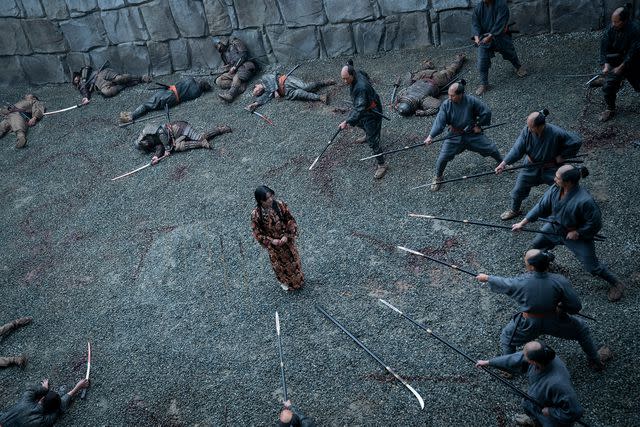The Shot: Inside Mariko's intense “Shōgun” showdown
"Shōgun" star Anna Sawai, showrunner Justin Marks, and writer Rachel Kondo break down the FX series’ most intense scene.
This article originally appeared in Entertainment Weekly's Awardist Emmys Kickoff special print issue.
Shōgun’s penultimate episode is quite possibly the series’ best, for several reasons. Among them is a climactic standoff between Lady Mariko (Anna Sawai) and a group of Lord Ishido’s guards, who are trying to prevent her and Lord Toranaga’s wives from peacefully leaving Osaka.
While Mariko has long had a death wish — her life was spared when her father was forced to kill his family and himself after assassinating the former leader of Japan years prior — she defies the threat at hand, even as her own guards are killed by arrows showering down on them. Skillfully wielding a naginata, Mariko challenges the opposing soldiers, despite knowing she’s no match for the imposing foes.
Related: Shōgun seasons 2 and 3 in the works, will likely shake up Emmys race

Katie Yu/FX
Anna Sawai on 'Shogun'Sawai recalls being similarly overwhelmed and not sure “how we were going to shoot” the “massive scene” when she first read the script. And indeed, it was an undertaking, shot on multiple cameras over several days. “Which in television is just unheard of,” showrunner Justin Marks tells Entertainment Weekly.
But the gravity of the situation is undeniable. “She’s outnumbered in every way, shape, and form — and outarmed,” Marks explains. “What she’s doing is expressing the strength of her will and [acting] in protest for all that’s going on.”
Unable to fulfill her duty to Toranaga by freeing his family, who are widely considered political prisoners, Mariko proclaims that she will take her own life at sunset. Rachel Kondo, who co-wrote the episode with Caillin Puente, credits the 1975 novel’s author, James Clavell, for being ahead of his time with his portrayal of a woman in 1600s Japan and sidestepping many of the tropes and clichés of Eastern culture that have long plagued Western cinema.
Check out more from EW's The Awardist, featuring exclusive interviews, analysis, and our podcast diving into all the highlights from the year's best in TV.
“This is a 1,200-page story that [Clavell] hung on the moral courage of one woman,” Kondo says. “It makes it look like it’s the right choice, and it’s effortless almost, because how it looks and how we perceive it is that she’s the one who just has to stick to what she knows and believes is right.… That is almost the sorcery behind her performance — it looks easy because she’s simply at war.”
—Reporting by Nick Romano
Read the original article on Entertainment Weekly.

 Yahoo Lifestyle
Yahoo Lifestyle 
